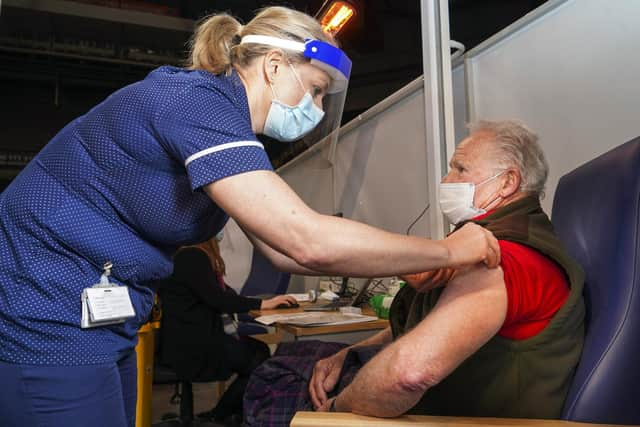The full list of 10 million people eligible for Covid jab from today as new phase begins
and live on Freeview channel 276
They join clinically vulnerable people and those aged 65 to 69 in being the next groups in line for coronavirus vaccines, NHS England said.
The Carers UK charity said being invited for a jab will bring many unpaid carers “a huge sense of relief”.
Advertisement
Hide AdAdvertisement
Hide AdOn Sunday, Boris Johnson said jabs have been offered to everyone in the Government’s top four priority groups in England.


The priority list set out by the Joint Committee on Vaccination and Immunisation (JCVI) includes nine categories.
The top priority was care home residents and their carers, followed by people over the age of 80 and frontline health and social care workers.
The third priority group was people aged 75 and over, and the fourth group was people over the age of 70 and those deemed to be “clinically extremely vulnerable”.
Advertisement
Hide AdAdvertisement
Hide AdThe fifth group is all those 65 years of age and over (2.9m), while the sixth group is all individuals aged 16 to 64 years with underlying health conditions which put them at higher risk of serious disease and mortality (7.3m).
This includes anyone with
- a blood cancer (such as leukaemia, lymphoma or myeloma)
- diabetes
- dementia
- a heart problem
- a chest complaint or breathing difficulties, including bronchitis, emphysema or severe asthma
- a kidney disease
- a liver disease
- lowered immunity due to disease or treatment (such as HIV infection, steroid medication, chemotherapy or radiotherapy)
- rheumatoid arthritis, lupus or psoriasis (who may require long term immunosuppressive treatments)
- have had an organ transplant
- had a stroke or a transient ischaemic attack (TIA)
- a neurological or muscle wasting condition
- a severe or profound learning disability
Advertisement
Hide AdAdvertisement
Hide Ad- a problem with your spleen, example sickle cell disease, or you have had your spleen removed
- are seriously overweight (BMI of 40 and above)
- are severely mentally ill
The sixth group also includes those who are in receipt of a carer’s allowance, or those who are the main carer of an elderly or disabled person whose welfare may be at risk if the carer falls ill.
Helen Walker, chief executive of Carers UK, said: “The Government, NHS and those administering the Covid-19 vaccines have made excellent progress in the last 10 weeks.
“Being called for the vaccine in this next phase will bring many unpaid carers a huge sense of relief, having carefully managed the risk of the virus to themselves and their older or disabled relatives for almost a year.
Advertisement
Hide AdAdvertisement
Hide Ad“Carers should wait to be called to book an appointment, and once vaccinated some of the hardest-pressed carers will be able to access support with their caring role for the first time in many months.
“This will be the biggest identification programme of unpaid carers ever carried out and should see more carers connected to local support systems.”
People who have received a letter can log on to the national booking service at www.nhs.uk/covid-vaccination and choose from more than 100 vaccination centres or almost 200 pharmacy services.
Anyone unable to book online can call 119 free of charge anytime between 7am and 11pm seven days a week.